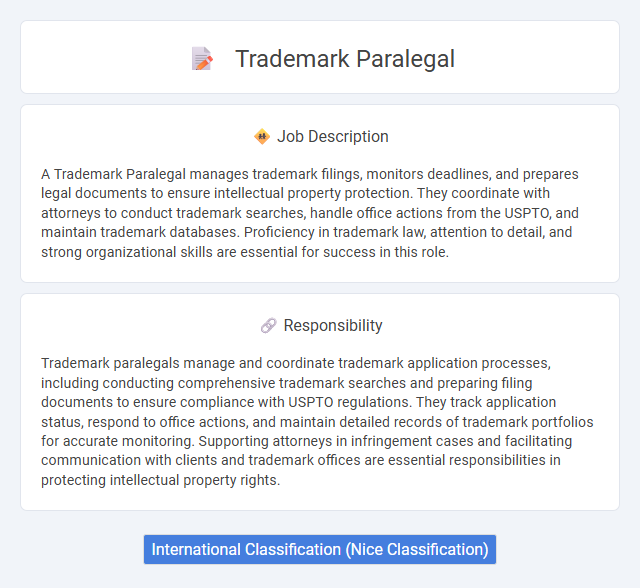
A Trademark Paralegal manages trademark filings, monitors deadlines, and prepares legal documents to ensure intellectual property protection. They coordinate with attorneys to conduct trademark searches, handle office actions from the USPTO, and maintain trademark databases. Proficiency in trademark law, attention to detail, and strong organizational skills are essential for success in this role.
Individuals with strong organizational skills, attention to detail, and an interest in intellectual property law will likely be well-suited for a trademark paralegal position. Those who enjoy working with legal documents, managing deadlines, and conducting research may find this role aligns with their abilities and preferences. Candidates who struggle with meticulous tasks or lack interest in legal procedures may face challenges in succeeding as trademark paralegals.
Qualification
Trademark paralegal jobs require a strong understanding of intellectual property law, specifically trademark processes, registrations, and oppositions. Candidates must possess excellent research, communication, and organizational skills, alongside experience with trademark databases and filing systems such as the USPTO's Trademark Electronic Application System (TEAS). A paralegal certificate or degree in legal studies, combined with prior experience in trademark law or intellectual property firms, significantly enhances job qualifications.
Responsibility
Trademark paralegals manage and coordinate trademark application processes, including conducting comprehensive trademark searches and preparing filing documents to ensure compliance with USPTO regulations. They track application status, respond to office actions, and maintain detailed records of trademark portfolios for accurate monitoring. Supporting attorneys in infringement cases and facilitating communication with clients and trademark offices are essential responsibilities in protecting intellectual property rights.
Benefit
A trademark paralegal role likely offers significant benefits such as gaining specialized expertise in intellectual property law, enhancing skills in trademark application processes, and increasing career advancement opportunities. The position may provide exposure to a dynamic legal environment, boosting professional development through collaboration with attorneys and clients. Financially, trademark paralegal jobs could offer competitive salaries and the potential for performance-based incentives.
Challenge
Working as a trademark paralegal likely involves navigating complex intellectual property regulations and managing detailed documentation, which can present significant challenges. The role probably demands strong organizational skills and meticulous attention to deadlines to ensure trademark applications and renewals proceed smoothly. Candidates may often encounter ambiguous legal terminology, requiring continuous learning and adaptability to effectively support trademark attorneys.
Career Advancement
A Trademark paralegal plays a critical role in managing intellectual property portfolios, conducting trademark searches, and preparing applications, which builds a foundation for career advancement into senior paralegal roles or intellectual property specialist positions. Gaining expertise in U.S. Patent and Trademark Office (USPTO) procedures and leveraging project management skills enhances opportunities for promotion to roles such as trademark coordinator or legal assistant manager. Continuing education through certifications like the Certified Paralegal (CP) or Intellectual Property Law specialization accelerates progression toward leadership positions within law firms or corporate legal departments.
Key Terms
International Classification (Nice Classification)
A trademark paralegal specializing in International Classification (Nice Classification) plays a crucial role in categorizing goods and services to ensure accurate trademark registration across jurisdictions. Expertise in the Nice Classification system ensures proper identification of classes, facilitating smooth trademark applications and reducing the risk of refusals or oppositions. Proficiency with the World Intellectual Property Organization (WIPO) guidelines and updates to the Nice Classification enhances global trademark portfolio management and compliance.
 kuljobs.com
kuljobs.com